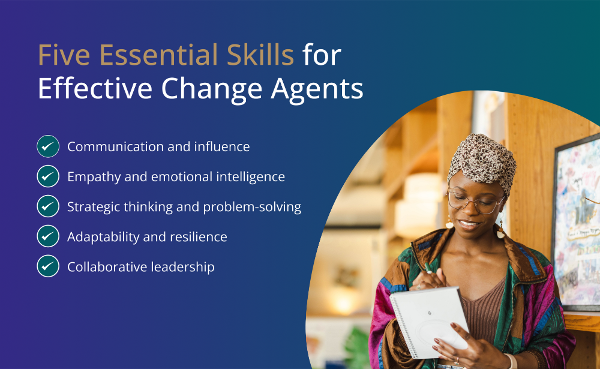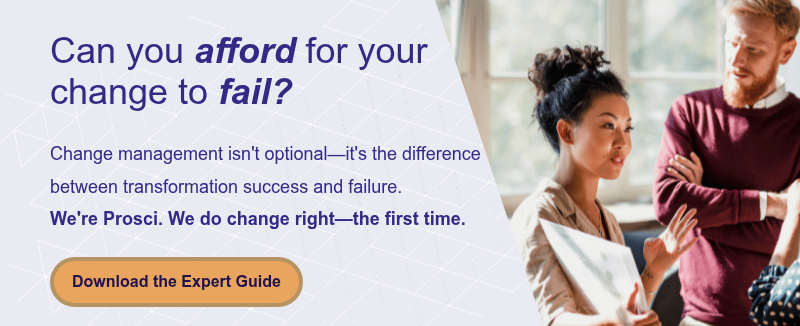Change Agents: Catalysts for Organizational Growth

11 Mins
Updated: October 17, 2025
Published: May 27, 2024

Thirty percent of organizational leaders reported that resistance to change is one of the top barriers to a successful change initiative—regardless of the industry.
Thankfully, key leaders within your organization can act as change agents to promote and support critical changes within your organization.
Organizations across the public and private sectors have to navigate complex changes—like implementing new technologies and responding to market dynamics—and individual people in the organization must adopt and use them.
Prosci research shows that organizations that leverage networks of change agents have higher success rates with these changes, achieving project objectives 50% of the time compared to 41% for those without such networks.
Let’s take an in-depth look at the role change agents play in driving transformation in large organizational environments—from the theory behind them to case studies highlighting the impact they have during times of change.
What Is a Change Agent?
A change agent is a person who promotes and helps others in an organization accept and enact change. They act as a catalyst for improving systems, processes, culture, and other outcomes.
Change agents are sometimes also called change influencers or change champions. You might even see them referred to as “agents of change,” but that term can be used more broadly to describe people who engage in societal change. The people we’re focused on here are those who facilitate organizational change initiatives by providing technical and social support.
But there’s no one-size-fits-all definition for change agents—the exact role they play in driving organizational change depends on the context of the organization and the scope of the proposed change.
For decades, we’ve worked with clients on complex, large-scale transitions. To help people impacted by the changes, we developed "I-By" statements that clearly define their roles early in the process, so they can move forward:
“I, (role), contribute to adoption and usage by (specific action).”
For example, a change practitioner might help an IT manager develop the following I-By statement during an ERP systems transformation: “I, the IT manager, contribute to the adoption and usage of the new ERP system by addressing the technical questions and concerns of other departments.”
“I-By” statements articulate the impact of change on individuals and identify specific benefits, directly addressing common points of resistance.
For larger initiatives, companies can build a change agent network to ensure support for the change at all organizational levels, across multiple locations and regions, and even with different cultures.
Characteristics of effective change agents
While there are many kinds of change agents, they tend to have many of the same key qualities. Here are some of the top skills change agents need to drive effective change within their organization.

- Communication and influence – Change agents need excellent speaking and listening skills to advocate for change and ensure understanding. Building up influence and trust also helps them secure commitment from impacted groups and facilitates the smooth adoption of new practices. If there are conflicts, change agents can play a key role in mediation.
- Empathy and emotional intelligence – Empathy allows change agents to perceive and understand the anxieties that change provokes. Emotional intelligence enables them to understand resistance behaviors and alleviate stress while creating a more supportive environment.
- Strategic thinking and problem-solving – Change agents engage in strategic planning, risk assessment, and complex problem-solving. They need to see the bigger picture and anticipate roadblocks during decision-making so the initiative stays aligned with the organization's overall objectives.
- Flexibility and resilience – The path of change is rarely smooth or predictable. Successful change agents can pivot strategies as needed and demonstrate resilience in the face of setbacks, modeling this resilience for others in the organization.
- Collaborative, accountable leadership – Change agents can serve as a bridge between leadership and the rest of the organization. This involves empowering others, facilitating teamwork, and building consensus around the change initiative.
Now that you understand the skills necessary to be an effective agent of change, let’s look at the difference between this role and another critical part of the change management process.
Change agent versus change practitioner
The roles of a change practitioner and a change agent are distinct yet complementary. The two work alongside each other to help drive change.
A Prosci Certified Change Practitioner is a professional trained in the Prosci Methodology who focuses on applying structured change management strategies and plans across an organization.
Change practitioners work with stakeholders across leadership and management to build and carry out the change management strategy. They also hold a variety of roles and are often responsible for the overall management of the change-adoption process, including:
- Strategy formulation
- Plan development
- High-level change enablement
Practitioners often work behind the scenes, coordinating efforts, supporting people-facing roles, developing change management plans, and ensuring that change management activities integrate with the project plan.
Conversely, a change agent, sometimes part of a change agent network, acts as an extension of the change management team to facilitate organizational change.
These change agents can be managers, supervisors or influential peers who interact with employees impacted by change in the organization. Their role is more hands-on and interpersonal, focused on promoting and modeling the change.
They typically:
- Advocate for the change
- Communicate its benefits
- Support their colleagues through the transition
Both roles play a valuable part in the change management journey. However, those who use change agent networks are much more likely to meet their project objectives than those who don’t.
Impact of Using a Change Agent Network (CAN) on Meeting or Exceeding Project Objectives

They’re are crucial for the success of change initiatives with change agents serving as the bridge between the change management team and the wider employee base.
Driving Successful Change With Change Agent Networks
The Prosci Methodology offers a structured and evidence-based framework for addressing the challenges inherent in organizational change. Central to this approach is the Prosci ADKAR® Model, which outlines the elements of change each individual must achieve: Awareness, Desire, Knowledge, Ability and Reinforcement.
The Prosci ADKAR Model provides change agents with a clear roadmap to support individuals through the change process. Change agents can be particularly helpful with building Awareness and Desire—the first two elements of the ADKAR Model—which are crucial for individuals to embrace change.
The Prosci ADKAR Model

The Prosci Methodology enables change teams to scale our ADKAR Model at the organizational level through practical tools and approaches that help you achieve lasting change.
What Types of Change Agents Are There?
Change agents come in various forms, each playing a distinct role in guiding organizations through transitions. Whether working internally within an organization or providing external expertise, these agents act as key drivers of change. They don’t only help navigate disruptions but also ensure that change initiatives are embraced and implemented successfully.
External change agents vs. internal change agents
There are two broad change agent categories: internal and external. Both bring unique perspectives and advantages to change management, but their roles and methods of engagement differ significantly.
Internal change agents
Internal change agents are individuals who already work within the organization. They could be leaders, managers, or influential employees with firsthand knowledge of the organization’s culture, processes and goals.
Key contributions:
- Deep knowledge – They understand the inner workings of the organization, which helps them align change initiatives with the company’s culture and operational structure.
- Trust and influence – They often have established relationships with other employees, and their influence helps with building commitment with people. Internal change agents also have insights and experiences that help with identifying barriers to adoption and preventing resistance to change.
- Long-term commitment – As permanent employees of the organization, they’re invested in the long-term success of the change and can monitor its impact over time.
For example, an internal change agent might be a manager who pays close attention to industry trends and best practices. This person would have the knowledge to see how those new trends could impact the organization, the influence to implement change accordingly, and the commitment to see it through to the end.
External change agents
External change agents are consultants or third-party practitioners brought in to facilitate change initiatives.
Key contributions:
- Unbiased perspective – External agents offer a neutral, outside view that can help identify issues or opportunities that internal teams might overlook. They’re also unconstrained by internal politics.
- Specialized expertise – Many external change agents have deep experience across industries, bringing best practices and innovative solutions to complex challenges.
- Temporary engagement – Their involvement is typically project-based, which means that organizations that use external change agents can increase their capacity for managing change without increasing their headcount.
An external change agent like a consultant might come on board to complete a specific project, like implementing a new manufacturing process. The consultant would have the perspective and expertise to advise leadership on what changes are necessary to implement the process and be available for the short-term engagement of putting the process into place.
While internal change agents are key to building ongoing support and sustainability within an organization, external change agents offer fresh insights and specialized skills that might be lacking internally. Together, both types can complement each other, creating a well-rounded approach to organizational change.
More types of change agents
Beyond the distinction between internal and external, change agents can take on more specialized roles depending on the nature of the change initiative. Let’s examine some of these roles and their unique contributions to the change process.
People-centric (people-focused) change agents
People-centric change agents focus on the human side of change, emphasizing the need to boost employee morale and motivation throughout the transition. They play a crucial role in helping individuals within the organization adjust to new roles, processes or technologies.
These change agents often work on goal-setting, training and upskilling, ensuring that employees feel prepared and supported. For example, one people-centric change agent could be a human resources specialist who focuses on employee well-being during a merger, ensuring that staff receive counseling and support to adjust to new roles and organizational culture.
Greatest Change Management Obstacles

People-centric change agents can address many of the greatest obstacles that change managers face, such as engagement with people affected by changes, building support with leaders, and removing barriers that create resistance to change.
Key contributions:
- Motivate employees through goal-setting and recognition.
- Provide training and development opportunities to help employees adapt to new skills or roles.
- Act as a bridge between leadership and staff to ensure peoples’ concerns are heard and addressed.
By focusing on building a positive emotional response to change, people-centric agents foster engagement and build enthusiasm for change.
Structure-centric (organizational & operational structure) change agents
Structure-centric change agents focus on improving the organizational infrastructure to support change. This could involve researching and implementing new technologies, streamlining workflows, or restructuring teams to optimize efficiency. These change agents are particularly valuable when an organization undergoes a major transformation that requires reevaluating how departments interact and allocate resources.
Structure-centric change agents are often involved in the technical side of change and may have roles like project managers or solutions developers. Project managers are also one of the Core Roles during change, reflecting how important they are to the change process.
Prosci Unified Value Proposition
Key contributions:
- Conduct systems analysis to identify inefficiencies and bottlenecks
- Research and implementing new technologies to improve team performance
- Design more effective organizational structures to support long-term growth
These change agents make tangible impacts by customizing structures to suit change goals
Process-centric (internal process) change agents
Process-centric change agents work to improve internal processes, focusing on streamlining operations and facilitating communication across teams. Their aim is to enhance the ways that people work together, ensuring that decision-making processes, intergroup relations, and communication channels are optimized to support the change initiative.
These agents are essential in environments where cross-functional collaboration is critical to success. For example, it could be a business analyst who identifies bottlenecks in the current sales process and designs streamlined procedures to enhance communication and decision-making.
Key contributions:
- Facilitate cooperation between different departments or teams
- Optimize communication channels to ensure transparency and efficiency
- Improve decision-making processes to align with the new organizational goals
By focusing on processes, these change agents are especially important while building the Ability and Reinforcement elements of change.
Consultants
Consultants serve as external or internal advisors. They ensure a two-way flow of information between the change management team and the rest of the organization.
Their primary function is to gather and analyze data, providing actionable insights to drive change forward. Consultants are often involved in performing competitive analyses, workforce assessments, and other forms of research that help shape the strategy behind the change. They also coach and mentor change teams and sponsors to help them perform their roles.
Key contributions:
- Provide data-driven insights and recommendations for change
- Ensure information flows smoothly between different levels of the organization
- Offer an unbiased analysis of current operations and future needs
Consultants aren’t just a job a job title here—they play a key role by providing an outside perspective and expertise.
Communicators and advocators
These change agents focus on communicating the change effectively to all stakeholders. They advocate for the change, ensuring that its benefits are clearly understood by the workforce.
The communications specialist can support the change practitioner by helping them to develop a communications plan, disseminate messages across the organization, and relay feedback to the project team. This person could be a communications-focused consultant, for example.
Key contributions:
- Ensure clear, consistent communication about the goals and benefits of the change
- Advocate for the change within the organization to garner support
- Help employees understand the impact of the change on their roles
By helping everyone communicate well, these change agents make sure your change can go as smoothly as possible.
Trainers
Trainers play an essential role in helping employees acquire the new skills they need to succeed during a change initiative. They design and deliver workshops, training plans and programs, and other learning opportunities to ensure that employees are equipped with the knowledge they need to adopt and use the new processes or technologies being introduced. A trainer might be a member of the HR team or a manager who designs and delivers workshops to equip employees with the skills needed to use new project management tools introduced in the organization.
Key contributions:
- Design and deliver training programs.
- Help employees build the necessary skills to thrive in a changed environment.
- Provide ongoing support during the transition.
Trainers are critical in helping people move through the Knowledge and Ability elements of the ADKAR Model, and help people continue learning with Reinforcement throughout the lifecycle of a change.
Analysts
Analysts focus on investigating current problems and anticipating future challenges. Through competitive analysis, force field analysis, or other modes of analysis, they identify obstacles and opportunities for the change initiative. These change agents might have titles like “business analyst” that reflect their role in looking into business problems and making recommendations accordingly.
Key contributions:
- Conduct analyses to identify potential barriers to change
- Provide insights that shape strategic decision-making
- Anticipate future trends or issues that could impact the change
Analysts give you the tools to make the right decisions as you strategize around your next changes.
Influencers
Influencers are individuals with strong relationships and a positive reputation across departments. They play a crucial role in promoting change by building trust and encouraging adoption among their peers. While influencers may not hold formal roles in the change management team, their informal leadership can significantly impact the success of a change initiative.
Sponsors are sometimes referred to as influencers. However, their roles differ. Sponsors are formal leaders who authorize and ensure that change happens successfully. They’re one of the Core Roles during change management and are critical to the success of any change effort. Sponsors actively and visibly participate throughout the project, build coalitions, and communicate directly with employees to drive the change forward.
For example, the primary sponsor could be a senior executive who actively leads the change by communicating the strategic benefits and aligning the initiative with organizational goals. Meanwhile, an influencer could be a team leader who isn’t formally part of the change management team but uses their strong relationships to informally advocate for the change, addressing concerns and sharing positive experiences with the new system. This dual approach utilizes both formal sponsorship and informal influence to enhance the change effort.
Key contributions:
- Build trust and commitment with employees
- Act as informal leaders who model and advocate for change
- Encourage others to embrace the new direction
Influencers are critical for building change readiness and can contribute at every stage of the change process.
Roles and Benefits of Change Agents
The last decade saw several unprecedented events prompting significant organizational changes. From rapid shifts to remote work during the global pandemic to integrating artificial intelligence into tech stacks, the ability to drive change is indispensable.
In the Prosci 5 Tenets of Change Management, which clarify the context and purpose of change management, the third tenet states that organizational outcomes are the collective result of individual change. It also helps explain why agents of change are so important. They help drive individual change across all relevant teams and departments, including:
- Delivering change-related communication
- Training and implementation support
- Role-modeling change for their team and peers
- Managing change within their immediate domain
Change Agent Network Roles and Responsibilities

Change agents embody the Prosci principle that successful change is rooted in understanding and managing the people side of change.
Embedding a network of change agents throughout all departments and organizational levels builds your capacity to quickly adopt new processes. Considering the myriad disruptive forces facing modern organizations—from new technology to macroeconomic forces—this capacity for quick, effective change quickly becomes a competitive edge.
How Prosci built a change agent network with Avangrid
A large American energy and utility company, Avangrid, wanted to increase its capacity to respond to the changing energy sector in an agile, efficient manner. The company employed over 7,000 employees across 23 states and had over $31 billion in assets at the time.
In 2013, the newly formed Avangrid Change Management Office (CMO) worked with Prosci to create a structured program to guide the change of new systems and processes. One of the key actions involved in creating an internal change agent network across the massive organization was to ensure all teams, departments, and locations were prepared for change. The implementation process involved a joint effort between the CMO and business area leaders to:
- Develop strict criteria for applicants.
- Select leaders with technical and people skills.
- Train employees in Prosci training programs.
- Obtain Prosci Certifications for each leader.
By the end of the engagement, Avangrid had sent 20 employees through the Prosci Change Management Certification Program operating across locations as a decentralized network.
Read the full Avangrid-Prosci success story here.
Start Your Next Change Today by Investing in a Change Agent Network
The journey of a change agent is one of continuous learning and adaptation. Embracing the Prosci Methodology can provide a solid foundation. But the key to success lies in being adaptable and responsive to the evolving business landscape.
Reflect on your organization's readiness for change and consider how you, as a change agent, can drive growth and innovation. Remember, the future belongs to those who are prepared to lead through change.




